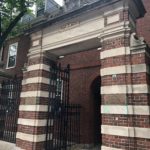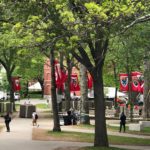While attending the American Literature Association conference in Boston, I could not resist the opportunity to visit a fellow Frankenreads project participant, Professor Deidre Lynch of Harvard University, and deliver a copy of Litteraria Pragensia. We had quite a lively chat about Frankenstein, the international impact of Frankenreads, and the history of Harvard and the inherent “creepiness” of older universities. I learned, for example, that Harvard’s holdings include vintage scientific instruments of the exact sort that would have inspired Mary Shelley, which were used to great effect (sorry) in a Monstrous Electrical Show as a part of Harvard’s Frankenreads festivities. It was fun to share our memories of Frankenweek with each other, and we capped our visit, as a couple of Gothicists might, with a trip to the resting place of several Harvard presidents, dignitaries, their wives, and, significantly, those who had been enslaved to them. According to Deidre, it makes an impact on her students to take them on site to impress upon them the reality that in death, we are all the same, waiting, perhaps, for a young scientist to transcend the limits of humanity with our mortal remains as his or her laboratory materials…
I could not think of a better way to spend an afternoon at the oldest American university than to reflect on young Victor’s entrance into, and then rejection of, Ingolstat, which becomes a kind of ironic metaphor for conformity and staidness. Victor, like so many iconoclasts to come, was a college dropout, and yet built and animated his creature without the benefit of a diploma. The question remains: Did he achieve higher learning? What is the purpose of university except to question what we learn there, or to put it to the test in “real” life. The university in its ideal state is, simultaneously, a retreat from the world and a constant reminder that we must find our places in that same world once we leave its ivy gates. Victor’s uneasiness with the university and its enforced conformity compelled him to take chances and create something new and strange, for better or worse, and so the university served its function even though Victor didn’t understand it at the time. Thinking about all the graduates who will celebrate their completed educations in many different disciplines in the month to come, Frankenstein serves as a potent reminder that with knowledge comes responsibility and the need to balance scientific advancement with ethical considerations and historical consciousness. This is yet another reason why Frankenstein endures, and why reading and discussing literature in general should be a part of one’s university experience no matter one’s major or area of study.
After an entire academic year of blogging all things Frankenreads, it is time for me to move on. The blog will remain as an archive, but no further posts will be added. I have enjoyed this project so much, and learned a great deal from my colleagues, both at Nord and in the worldwide academic community, as we worked together to help our students discover Shelley’s novel, and to rediscover it ourselves. I am deeply grateful to my students, colleagues and friends, and to everyone who participated in and supported Frankenreads. Thank you all for making this experience so worthwhile.
-Jessica





